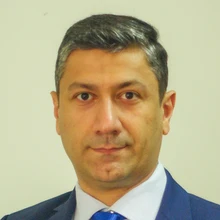The Case for a Self-Regulating Ceasefire in Ukraine[Over]  By Tabib HUSEYNOV, independent policy analyst and researcher By Tabib HUSEYNOV, independent policy analyst and researcher
Diplomatic initiatives to end the war in Ukraine are fundamentally misguided, because they seek a political solution that remains unattainable under current circumstances. International efforts should instead focus on securing a stable ceasefire that locks in the existing contact line without conditioning its achievement on impractical and damaging political concessions on Ukraine’s sovereignty or the fate of its occupied territories. The durability of such a ceasefire should rest primarily on Ukraine’s own strength, not on international peacekeepers or Russia’s goodwill.
Ukraine and Russia are locked in a grinding stalemate. Neither can achieve a decisive military victory any time soon, and neither can accept the political terms the other demands. Russian forces make incremental advances, but at the expense of staggering losses. Latest data on Russian casualties from the Ukrainian General Staff and the Ukrainian open-source mapping project Deep State suggest that between January and December 2025, Russia lost roughly 96 troops per square kilometre taken. With roughly 5,000 square km of Donetsk Oblast still under Ukrainian control, Russia would need to sacrifice close to half a million servicemen to occupy the remainder.
READ MORE
- Tuesday, 13 January 2026, 06:54
Armenia in 2026: What Is Next?[Over]  By Benyamin POGHOSYAN, PhD, Senior Research Fellow at the APRI Armenia By Benyamin POGHOSYAN, PhD, Senior Research Fellow at the APRI Armenia
Armenia’s pivotal 2026 looms: a year that will test fragile peace efforts with Azerbaijan and Turkey, redefine Yerevan’s ties with the EU and Russia, and unfold amid deepening political and societal polarization.
The year 2026 could be crucial for Armenia, significantly influencing both the foreign and domestic policy trajectory of the country. Externally, the main developments to monitor are the Armenia–Azerbaijan and Armenia–Turkey normalization processes. Will the August 2025 Washington Declaration bring the restoration of all regional communications – including the opening of the Armenia-Turkey border and the signature of an Armenia-Azerbaijan peace agreement – or will it meet the fate of previous, unsuccessful attempts to establish lasting peace and security in the South Caucasus? READ MORE
- Monday, 22 December 2025, 08:31
Leveraging Taiwan: India’s strategic counterbalance to China[Over]  By Shanthie Mariet D’SOUZA, PhD, founder & president, Mantraya Institute for Strategic Studies (MISS) By Shanthie Mariet D’SOUZA, PhD, founder & president, Mantraya Institute for Strategic Studies (MISS)
Record trade and closer ties with Taipei mark New Delhi’s shift from caution to assertiveness.
In 2024, for the first time ever, bilateral trade between India and Taiwan exceeded US$10 billion. And in the past six months alone, governments and businesses in the two countries have agreed on multipledeals that bring their semiconductor, tech, artificial intelligence, and industrial sectors even closer together, along with supply chains. These new trade partnerships support Taiwan’s “New Southbound Policy” and India’s “Act East” and “Make in India” policies, with Taiwan alone investing US$4.5 billion in India since February 2024. While the surge in Taiwanese investment in Indian companies is grounded in the economic dimension of the relationship, there is another dynamic taking place. Like most countries, New Delhi does not officially recognise Taipei. Yet its compliance with the “One China principle” – the condition set by Beijing that nations must diplomatically acknowledge there is only one Chinese government and must not establish official contacts with Taiwan – has become more nuanced. READ MORE
- Monday, 22 December 2025, 08:30
The support of UN member states for Uzbekistan's initiatives is the result of systemic reforms in the country[Over]  Gayrat Khonnazarov, Editor-in-Chief, UzA news agency
Gayrat Khonnazarov, Editor-in-Chief, UzA news agency
The Republic of Uzbekistan has demonstrated significant success in the international arena, strengthening its active participation in the United Nations (UN) and its specialized agencies. In 2024, the country achieved a number of key milestones that underline its commitment to universal principles and standards in the areas of human rights, socio-economic development, labor, and global cooperation.
READ MORE
- Friday, 27 December 2024, 19:35
Uzbekistan: Development of Culture – A Key Tool for Preserving National Identity[Over]  Ozodbek Nazarbekov, Minister of Culture of the Republic of Uzbekistan
Ozodbek Nazarbekov, Minister of Culture of the Republic of Uzbekistan
Culture and art are the foundation of civilization, national identity, and spiritual perfection, as well as important indicators of a country’s progress. The development of these spheres, reflecting the spiritual growth of the people, their past, present, and future, requires an approach that meets the demands of the times. This is why the reforms aimed at the development of culture and art in Uzbekistan carry profound meaning and are entering a new phase.
READ MORE
- Friday, 20 December 2024, 09:03
Uzbekistan on the way to a sustainable future: environmental initiatives and international cooperation[Over]  On November 11-13, President of Uzbekistan Shavkat Mirziyoyev is taking part in the World Summit on Combating Climate Change at the 29th session of the Conference of the Parties to the UN Framework Convention on Climate Change, which will be held in Baku.
On November 11-13, President of Uzbekistan Shavkat Mirziyoyev is taking part in the World Summit on Combating Climate Change at the 29th session of the Conference of the Parties to the UN Framework Convention on Climate Change, which will be held in Baku.
Delegations from almost 200 countries at the level of heads of state, government and ministers, representatives of international organizations, NGOs, expert, scientific and social circles are expected to participate in the conference. READ MORE
- Tuesday, 12 November 2024, 07:25
1
2
3
4
5
6
7
8
9
10
11
...
13
|
|